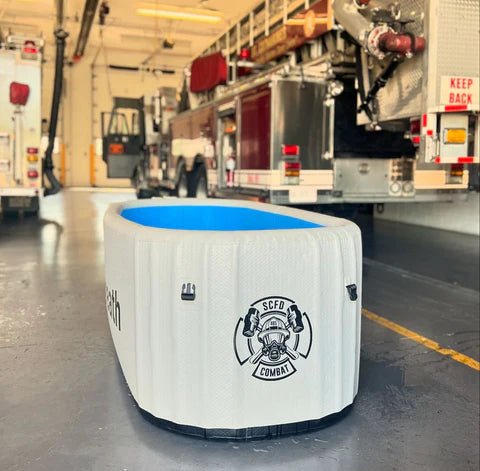First responders work in high-stress, physically demanding, and often life-threatening situations. Firefighters, paramedics, police officers, and other emergency personnel experience intense physical and mental pressure every day, which can lead to chronic stress, burnout, and injury.
Cold water therapy, also known as cold immersion or cold plunge therapy, is gaining popularity for its potential to reduce stress, boost physical recovery, and improve overall well-being. Let’s explore the benefits of cold water therapy and why it’s an essential recovery tool for first responders.

1. Accelerated Muscle Recovery and Reduced Inflammation
One of the primary benefits of cold water therapy for first responders is its ability to reduce inflammation and promote faster muscle recovery. Cold water immersion constricts blood vessels, reducing blood flow to affected areas and limiting swelling and inflammation. Once you’re out of the cold, blood flow rapidly returns to the area, flushing out metabolic waste and delivering fresh oxygen and nutrients to muscle tissues.
For first responders who carry heavy gear, perform repetitive motions, or engage in intense physical activity, this accelerated recovery process can be invaluable. Regular cold plunges can help them stay physically fit and resilient, reducing the risk of injury from cumulative strain and overuse.
2. Improved Mental Resilience and Stress Relief
Cold water therapy doesn’t just benefit the body; it has powerful mental benefits as well. Immersing in cold water activates the sympathetic nervous system, releasing endorphins, and prompting a natural stress-relief response. This practice helps improve resilience to stress over time, making it easier to cope with high-pressure situations on the job.
For first responders dealing with traumatic events, the mental and emotional release provided by cold water immersion can be a form of mental reset. Cold exposure teaches controlled breathing and focus, which can enhance mental clarity and help manage the symptoms of anxiety, PTSD, or chronic stress.
3. Enhanced Immune Function
Working in environments with high exposure to germs and stress can weaken the immune system, increasing the risk of illness. Studies show that regular cold exposure can boost immune function by promoting the production of white blood cells and other immune-boosting factors. For first responders, a strengthened immune system is crucial for staying healthy and maintaining job readiness.

4. Improved Sleep Quality
Quality sleep is vital for recovery, mental health, and overall performance. Unfortunately, first responders often face irregular sleep schedules due to shift work and stress, leading to sleep disorders and fatigue. Cold water therapy before bedtime can help improve sleep by lowering the body’s core temperature, which is a natural signal to the body that it’s time to rest. This cooling effect, combined with the stress-relief benefits, helps users fall asleep faster and enjoy deeper, more restorative sleep.5. Pain Management
First responders are at a higher risk of experiencing chronic pain due to their physically demanding roles. Cold water therapy can provide relief by numbing pain receptors and reducing inflammation in painful areas. Regular cold plunges can offer natural pain relief, reducing dependence on pain medication and supporting long-term wellness.
6. Enhanced Focus and Cognitive Performance
Cold water immersion can improve cognitive performance and focus, which are essential for first responders who must make quick decisions under pressure. The intense sensation of cold exposure heightens alertness and focus by releasing norepinephrine and other neurotransmitters linked to concentration and mental clarity. Regular cold plunges can help first responders stay sharp and responsive in critical situations.

